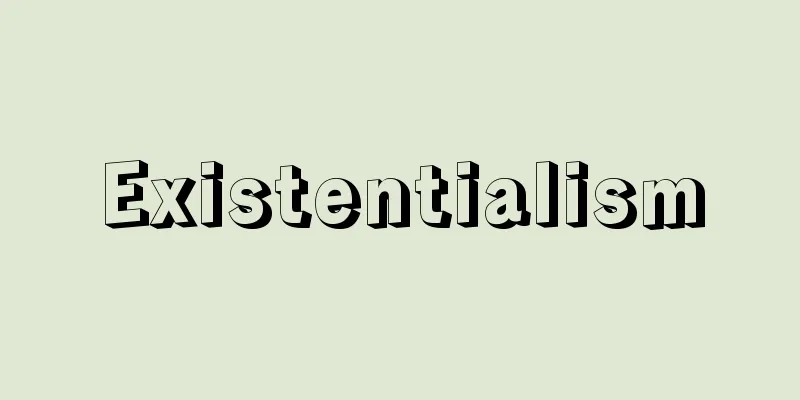Existentialism

|
A school of philosophy that seeks to explain the existence (real existence) of human beings in the world. It emerged as a conscious movement mainly in the 20th century, and Heidegger, Jaspers, Sartre, Marcel, and Merleau-Ponty are considered existentialist philosophers, but its characteristics can already be seen in 19th century thinkers such as Nietzsche and Kierkegaard. Kierkegaard, a direct forerunner of existentialism, emphasized the importance of human free choice, stating that part of the future depends on this choice and cannot be predicted by a closed rational system, and called such human existence existence existence. The position that emphasizes the philosophical importance of this individual existence that cannot be replaced by anything else is widely called existentialism. Although existentialism is sometimes seen as a reaction against traditional philosophy by irrationalists, it was mainly a theory developed within it. It rejects epistemology and seeks to deepen knowledge of human beings for three reasons. First, humans are not simply agents of cognition, but they worry, desire, manipulate, and above all, choose and act. Heidegger sees objects as tools to be used, not as "things" for cognition. Merleau-Ponty believes that the experience of life begins with the experience of one's own body. Second, the self (ego), which is sometimes necessary for the doctrine of epistemology, is not a fundamental feature of experience before reflection, but arises from the experience of others. The ego as an agent of cognition presupposes, rather than infers or constructs, the existence of external objects. Third, humans are not independent observers of the world, but exist "in the world." Humans "exist" in a special sense that is different from beings such as wood and stone. However, contrary to Descartes' view, humans accept the world without the intervention of knowledge or perception. There is no separate sphere of consciousness from which humans reason, project, or doubt external things. One reason existentialists reject Cartesian dualism is because they are more interested in being than in knowing, and they believe that phenomenology is also ontology. Human existence in a special sense means that a future is open to us, determined by our choices and actions. Other beings, such as trees and stones and tigers, have essences or instincts that determine what we are and what we do. In contrast, humans, as a species or as individuals, have no essence that governs their actions. Humans determine what they are by their choices, by the way they live (Kierkegaard), and by their special actions (Sartre). Even when we simply play a "given" role or follow "given" values (for example, given by God or society), we are in fact choosing to do so, because there are no given values, rational or accidental, that determine our choices alone. Not every choice is possible. Human "being-in-the-world" means that we are "abandoned" (Heidegger) to special circumstances. What seems to be at our disposal is not necessarily so, and we cannot know it in advance. Existentialists reject scientific materialism, arguing that human choices cannot be explained in any way. They also argue that the openness of the future and the specificity of individuals and their situations defy rational philosophical systems. This is another reason why they insist on "existence." Existence is not only different from knowledge, but also from abstract concepts that fail to capture the personal and particular. Existentialists do not advocate ethics in the sense of rules or values, because they believe that there are no rational reasons for human choices. Rather, they see ethics as a framework for thinking about actions and choices. This framework does not suggest what one should choose, but shows that there are right and wrong choices. People can be trustworthy or untrustworthy (Heidegger), and they can act sincerely or dishonestly (Sartre). Dishonest behavior would include blindly following the majority or supporting existing values and institutions. In particular, when humans face "limit situations" (Jaspers), such as death, suffering, conflict, and sin, they come to recognize their own responsibilities as agents, along with the ultimate incomprehensibility of the world in which they must act. Existentialism has had a major impact on psychology (Jaspers, Binswanger, Rehn), Christianity (Kierkegaard, Marcel), atheism (Heidegger, Sartre), theology (Barth, Tillich, Bultmann), and other fields outside philosophy. Existentialism does not harbor any particular political beliefs, but it does include an antipathy to conformism and the undermining of human freedom that leads to political activism, and an emphasis on responsibility (Sartre). Kierkegaard's exclusive recommendation of "indirect communication" was ignored by many existentialists, but the emphasis on specific situations and autonomous choice means that existential truths can be conveyed not only in philosophical treatises but also in dramas and novels. Interest in existentialism has given rise to many imaginative literary works (Sartre, Camus, Beauvoir). Furthermore, existentialist philosophy has provided a way of expressing and interpreting themes common to the literary works of all eras, such as those of Socrates, Shakespeare, Dostoevsky, and Faulkner. Source: Encyclopaedia Britannica Concise Encyclopedia About Encyclopaedia Britannica Concise Encyclopedia Information |
|
世界における人間の実存 (現実存在) を説明しようとする哲学の一派。主として 20世紀に意識的な運動となって現れ,ハイデガー,ヤスパース,サルトル,マルセル,メルロー=ポンティらが実存主義哲学者とされるが,その特徴は 19世紀の思想家であるニーチェやキルケゴールにもすでに認められる。直接の先駆者であるキルケゴールは人間の自由選択の意義を強調し,未来の一部分はこの選択にかかっており,閉鎖的な合理的体系によって予知しうるものではないとし,このような人間存在を実存と呼んだ。他のものと代置しえないこの個別的実存のもつ哲学的重要性を強調する立場が広く実存主義と称される。 非合理主義者による伝統哲学への反抗とみられることもあるが,実存主義はおもにその内部で発展した理論であった。次の3つの理由から認識論を否定し,人間に関する知識を深めようとする立場である。第1に,人間は単に認識主体ではなく,心配し,望み,あやつり,そしてなかんずく選択し,行動する。ハイデガーは物体を認識のための「物」ではなく,使うための道具とみなす。メルロー=ポンティは生の経験はみずからの肉体の経験から始るとする。第2に,認識論の教義にときとして必要な自己 (自我) は,内省以前の経験の基本的特徴ではなく,他人の経験から生じる。認識主体たる自我は,外の物の存在を推論したり構成するというよりは,むしろ前提としている。第3に,人間は世界の独立した観察者ではなく,「世界のなか」に存在する。人間は木石のような存在とは違う特殊な意味で「存在」する。しかし,デカルトの見解に反して,人間は知識や知覚の介在なしに世界を受入れる。人間が外の物を推論したり,映したり,疑う独立した意識の領域は存在しない。実存主義者がデカルト主義者の二元論を拒絶する理由の一つは,認識より存在に関心があり,現象学は存在論でもあると考えるからである。 特殊な意味で人間が存在するということは,みずからの選択と行動で決めた未来が開かれていることを意味する。木石やトラなどの他の存在は,自分が何であり,何をなすかを決める本質ないし本能をもつ。反対に,人間は自分の行動を支配するような本質を,種としても個としてももたない。人間は,みずからの選択,生き方の選択 (キルケゴール) ,特殊な行動 (サルトル) によって,みずからが何たるかを決める。単に「与えられた」役割を演じたり,「与えられた」価値 (たとえば神や社会から与えられた) に従っているときでさえ,実際にはそうすることを選んでいるのである。なぜなら,合理的にせよ偶然にせよ,人間の選択を単独で決定する与えられた価値は存在しないからである。どんな選択でも可能というわけではない。人間の「存在が世界のなかにある」ということは,特殊な状況に「放擲」 (ハイデガー) されていることを意味する。自由に利用できると思えるものも,実際にそうとは限らない。それを前もって知ることもできない。人間の選択は,どのような形にせよ説明できるものではないと実存論者は主張して,科学的唯物論を否定する。未来の開放性,個人とそのおかれた状況の特異性は合理的哲学体系を寄せつけない,とも主張する。それが,彼らが「存在」にこだわるもう一つの理由である。存在は,認識と異なるだけでなく,個人的なものや特殊なものをきちんととらえられない抽象概念とも異なる。 実存主義者は人間の選択には合理的な理由はないとしているので,規則や価値観という意味での倫理を提唱しない。むしろ倫理を行動や選択を考える枠組みとみる。この枠組みは選択すべきものを示唆するのではなく,正しい選択と誤った選択があることを示す。人は信頼できるものにも信頼できないものにもなれる (ハイデガー) し,誠実にも不誠実にも行動できる (サルトル) 。不誠実な行動とは,多数派に盲目的に従ったり,既存の価値や制度を支持することなどをいう。特に,人間は死,苦悩,争い,罪などの「限界状況」 (ヤスパース) に直面すると,自分が行動すべき世界の究極的な不可解さとともに,みずからの行為者としての責任を認識するようになる。 実存主義は,心理学 (ヤスパース,ビンスワンガー,レーン ) やキリスト教 (キルケゴール,マルセル) だけでなく,無神論 (ハイデガー,サルトル) や神学 (バルト,ティリヒ,ブルトマン ) など,哲学以外の分野にも大きな影響を与えた。実存主義は特定の政治的信条を内包しないが,政治的直接行動主義につながる人間の自由をそこなうものや体制順応主義への反感と責任の強調 (サルトル) を伴う。キルケゴールが唯一すすめる「間接的伝達」は実存主義者の多くに無視されたが,特定の状況と自律的選択の重視は,哲学論文だけでなくドラマや小説によっても,実存的真理を伝えうることを意味する。実存主義への関心は数々の想像力にあふれた文学作品 (サルトル,カミュ,ボーボアール ) を生んだ。そのうえ,実存主義哲学はあらゆる時代の文学作品,たとえばソクラテス,シェークスピア,ドストエフスキー,フォークナーに共通する主題を表現したり解釈する手段をもたらした。 出典 ブリタニカ国際大百科事典 小項目事典ブリタニカ国際大百科事典 小項目事典について 情報 |
<<: Existential analysis - Existenzanalyse (German)
Recommend
Hanabusaichou - Hanabusaichou
A painter of the early Edo period. The founder of...
Leyner, JG (English spelling) LeynerJG
…However, there was still no mechanism for removi...
Ithurus - Ithurus
…This story is mentioned in Homer's Odyssey b...
Tragulus javanicus
…[Tadaaki Imaizumi]. … *Some of the terminology t...
Unra - Unra
〘Noun〙 A modern Chinese percussion instrument. Ten...
Maxy, G. (English spelling) MaxyG
…One of the determining factors of market structu...
Yelu Chucai - A man of great skill
A meritorious official in the early Mongol Empire...
Heat-resistant steel - TAINETSUKOU
A series of alloy steels that are made to have su...
Sequoia
...This is probably due to the extinction of spec...
Cassandros
...After the death of the great king, a conflict ...
Novaruputa
…It is a Quaternary stratovolcano composed mainly...
Jarghuchi - Jarghuchi (English spelling)
A nomadic official position established during th...
M'Ba, L. (English spelling) MBaL
...In these circumstances, it was difficult to or...
Vine Cow - Vine Cow
The name for a superior strain of Wagyu beef that ...
Ljubljana - Ljubljana (English spelling)
The capital of the Republic of Slovenia. German n...









